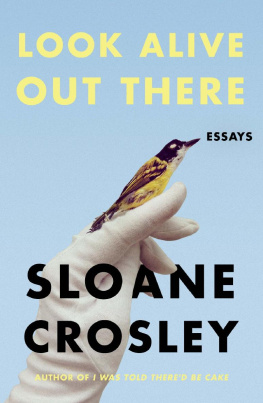
To Russell Perreault. Thank God youre so pretty.
When you live past the age of rebellion, and you still rebel, you seem to yourself a kind of senile Lucifer.
E. M. CIORAN
Contents
I AM RUNNING LATE FOR THE AIRPORT, TRYING TO CATCH A CAB ON my street corner. A woman in a wheelchair and her date, a man, arrive at the corner seconds after me. They pretend not to see me and I pretend not to see them, which is the kind of cutthroat strategy New Yorkers employ when embarking on otherwise benign activities. Its partially to avoid conflict and partially to claim innocence in the event of the finger. As the minutes pass and no cabs come, the tension grows. I make a big show of checking the time and rotating my suitcase back and forth. At long last, a cab drifts in our direction. Under normal circumstances the cab would be mine. I have the clear lead. But this particular vehicle is the model with the sliding doors, designated for handicapped access. Seeing as how my plane will definitely crash if I steal a cab from a woman in a wheelchair, I step aside.
Here, I say, you guys take it.
Thanks so much, says the man.
And for a whole three seconds, everyone in this scenario feels very good about themselves. The lack of fanfare is a kind of fanfare in itself, a celebration that society has not yet broken down into breadlines and ATM-based riots. We do not throw our handicapped under the bus. We move to the back of the bus for them.
The cab door gapes open on its tracks. The man leans down and puts a hand on each armrest of the wheelchair. He kisses the woman sweetly in what I assume is a casual assertion of their love. Then he unhands the chair and springs into the cab by himself. He waves at her from the open window. The cab wheels off in one direction, the woman in the other.
One of the very few things of which I am certain is that its not possible to be handicapped by association. Being in the social orbit of a person in a wheelchair does not entitle you to special accommodations and it certainly does not entitle you to someone elses cab. In a huff, I tug my luggage to the next block, thinking about how this man is the worst person to have ever lived. Meanwhile, the woman is just ahead of me. I begin to judge her, too. Physical impediments are nontransferable, but social ones are. You are who you kiss goodbye.
We stay the course for a couple of blocks. Shes covering twice as much ground. Its unclear if shes fleeing the scene or just more adept at slicing through crowds. But I try to catch up with her. Should an available cab arrive, I plan on announcing my urgent destination to the driver so that certain people might feel very guilty indeed.
We pass a liquor store where someone has tied up a dog outside. The dog, a bright-eyed mutt, sits with his legs stretched out on the pavement. Without so much as a swerve, the woman wheels over his tail. The dog jumps up and lets out a high-pitched yelp. The woman keeps going. Bystanders are transformed into witnesses. Upon hearing his pets cry, the dogs owner comes charging out of the store, looking for answers. The stores cashier stands in the doorway. Everyone hesitates to finger the culprit.
That woman, I say, pointing. She wheeled over his tail.
The mans face morphs from enraged to sympathetic as he registers this lady, forever seated, waiting for a traffic light to change.
Oh, he says, backing down, she probably didnt realize.
The dog, by now, has recovered from the incident. But I have not.
No, I correct him, she realizedshe just didnt care.
The man shrugs. The dog plows his wet nose into his owners palm. The whole point of pets is to have a living annex of your personality filled with all the qualities youd like to have but dont. Instant forgiveness is one of those qualities. If this guy is going to be so magnanimous, it seems redundant that he should even have a dog.
Shes in a wheelchair , the cashier pipes up behind me. Whats the matter with you?
WE HAD A TOWNHOUSE BUT WE WERENT ALLOWED TO TOUCH IT . I had to be lifted up by the armpits to peer inside. The brick faade appeared to be cut from a single sheet, but if you looked closely, you could see how my father had smeared cement onto miniature bricks with a butter knife. The townhouse was electric, too, modeled after its 1920s counterpart and outfitted with stained-glass lamps and micro-editions of Moby-Dick and Jane Eyre . There were even lights on the outside, brass sconces that framed the doorway and cast shadows on the perennially green hedges below.
The house I grew up in is not like this. Its compact and boxy, built on a cement slab and encased in vinyl siding. On the Tim Burton Sliding Architectural Scale, its less Beetlejuice , more Edward Scissorhands . Ours is one of two models of homes on the street. Its as if an architect approached the neighborhood the way you approach a child at mealtime. Youre not supposed to ask a child to conjure an ideal dinner out of thin air; youre supposed to say Chicken or spaghetti? or all hell breaks loose. The neighborhood itself is shaped like a ladle with four lines of streets cutting across the middle and one long one, which bends before merging into some woods. My parents live in the soup, surrounded by neighbors making an effort with koi ponds.
My whole life, my parents refused to do the decent thing and pretend they couldnt hear every step I took. I have never been trapped in a bunker or a submarine, but I have to assume theres an understanding in these situations. These people would never survive. If I picked up the phone in the kitchen, my fathers voice would come booming from the basement, asking who I was calling. If I unfolded a blanket in the den, my mother would shout down from the top floor, offering me another one. If I passed their bedroom door, they would demand to know what I was up to. Seems harmless enough until you know that the only room after theirs was the bathroom.
Thus, the townhouse became my platonic ideal of a house. It was always grand and peaceful. It stood in the corner of the living room, covered with a tarp like a birdcage. Light from the television would be visible to any tiny people living inside. They would be able to hear my parents cries of What are you watching? as I changed the channel. But there were no tiny people beneath the tarp. No eyes to see or ears to hear. No one to tell me that I would one day live in Manhattan, where if someone follows you around, asking you who youre calling, you can have that person arrested.
* * *
A couple of decades later I was living in a railroad apartment in Chelsea, illegally subletting it from a friends sister. The sister lived in Los Angeles and I never met her, despite repeated offers to meet whenever I happened to be in Los Angeles. This was for her benefit, not mine. If it were me, Id want to vet me. But I never heard back from her. I never heard from her at all, actually. One time the peephole fell out, a thing I did not realize peepholes could dojust dislodge themselves and come thudding onto the floor like a car part. I wrote to her, explaining what had happened. No response. Eventually, I taped the receipt for a new peephole to my reduced rent check, which she cashed without a, wellyou know. The second I saw her name appear on my phone, I knew I was getting evicted.
Not wanting to stray too far from home, I paid a broker to find me a place nearby. In the easiest gig of that guys already unchallenging career, we walked nine blocks south to a prewar building, the kind with a name engraved above the awning but none of the residents could tell you what it is. The broker unlocked the door to a 600-square-foot one-bedroom on the second floor that had been recently occupied by a boy (the clothes pole in the closet was missing). But the moldings were thick enough to double as bookshelves and the view was unreal. Dogwood trees shaded a row of the private backyards of townhouses. Cherry blossom detritus drizzled in the wind. A blue jay landed on the fire escape. It was the first apartment I saw, I could barely afford it, and I took it immediately.
Next page









